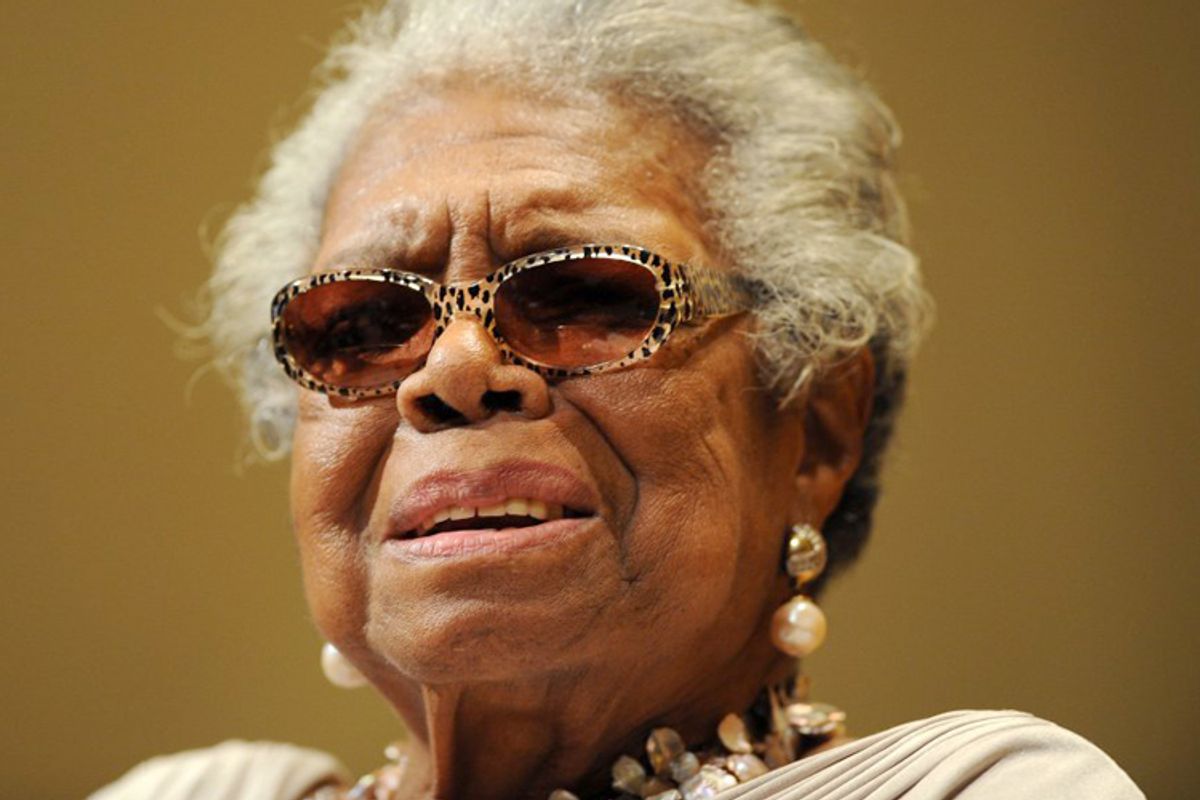When Maya Angelou published her memoir "I Know Why the Caged Bird Sings" in 1970, it was not the first first-person account of an African-American woman's life, but it was the first of a new breed of unflinchingly honest ones.
In addition to offering a powerful testimony to the effect of racism on her childhood (the first of six volumes of autobiography, the book covers Angelou's life from age 3 to 17), "I Know Why the Caged Bird Sings" dared to speak of the particular hardships suffered by black women within their own community; Angelou was raped by her mother's boyfriend at age 7 and successfully testified against the man in court, although this trauma was followed by a five-year period of speechlessness. In the following decades, the aftermath of the civil rights movement, Angelou's fearlessness helped pioneer a literary blossoming for African-American women that would encompass such figures as Alice Walker, Paule Marshall, Toni Cade Bambara and Nobel laureate Toni Morrison.
Angelou, who died earlier today at the age of 86, had already lived an eventful life before she decided to tell her story. She had edited a newspaper in Egypt, been the first black female streetcar conductor in San Francisco, recorded a Calypso album, danced with Alvin Ailey and worked as an actress, prostitute, madam and waitress. "By the time I was 14, I was 6 feet tall," she told USA Today. "I've never been able to hide." It was her friend James Baldwin who recognized in this charismatic and frank talker a writer whose story demanded to be told.
For Angelou, books and literature -- introduced to her by a beloved teacher -- provided salvation, first as refuge from the world and eventually as a way of making her place in it. She credited her newfound love of reading with giving her back her voice. Although she spent her earliest years in some financial security, living with a grandmother who owned a successful general store in Stamps, Arkansas, by the age of 17 she had become a single mother and slipped into what she described as "poverty and crime." After a brief marriage and a stint in a traveling production of "Porgy and Bess," she moved to New York City, where she became involved in Harlem literary circles and civil rights campaigns. (She would meet Martin Luther King Jr. and befriend Malcolm X.) A relationship with a South African activist took her to Egypt and Africa, where she worked as a journalist.
"I Know Why the Caged Bird Sings" became the first of 36 books that included poetry, essay collections, children’s books and cookbooks as well as the memoirs. She acted for stage and screen (receiving a Tony nomination for her role in the 1974 play "Look Away") and at the age of 68 directed her first feature film, "Down in the Delta." Angelou's creative energy was legendary, prompting her to rise early to work every morning in an empty motel room near her home in Winston-Salem, North Carolina, equipped with only a Bible, a dictionary, a stack of notepads and a bottle of sherry.
But Angelou always felt teaching to be her true vocation, and often framed her other activities in that light. She was the Reynolds professor of American studies at Wake Forest University in Winston-Salem. Perhaps she became best known to the American public through her work as a poet (as improbable as that may seem given the obscurity poets generally endure in this country). There have been 19 poets laureate since the position was created in 1986 and Angelou never held the title herself, but if anyone qualified for the position, it was she. Her reading of her poem "On the Pulse of the Morning" at the inauguration of President Bill Clinton captured the potential and optimism many Americans felt at the passing of the Reagan-Bush era. She was presented with the nation's highest civilian honor, the Presidential Medal of Freedom, by President Barack Obama in 2011.
As the years went by, Angelou's poetry and public statements increasingly moved toward that most popular of all American literary forms, the uplifting and inspiring maxim. No doubt channeling the grandmother whose industry, self-reliance and ambition she admired so much, she licensed her name to a line of Hallmark cards. The poetry world might frown on such popularization, but the public adored her and found in her words both wisdom and comfort. Angelou's is a style that lends itself well to the realm of social media, with its informal habit of sharing and passing along quotations and mottos, so it's no surprise she maintained an active Twitter feed up until five days before her death. Her last message -- "Listen to yourself and in that quietude you might hear the voice of God" -- conveys the boundless warmth, hope and serenity that made her so beloved.



Shares